Vaughan gift helps cultivate leadership skills of diverse health care professionals
By Sharon Reynolds
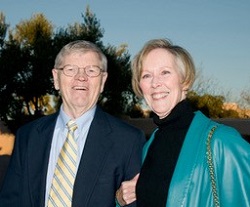 |
|
Drs. Bob and Sue Vaughan are enjoying retirement and changing the world through community service.
|
Drs. Sue and Bob Vaughan met in 1971, and their story is one of a flourishing and loving partnership. Together, they are making changes in a world that has become their classroom. They looked beyond their medical educations—to business schools, political venues, and each other—to develop management, leadership, and personal skills. They made lofty education and career goals to realize their dreams. Today they are enjoying retirement in Tucson, Arizona, and they continue to be engaged with the next generation of healthcare professionals, something that energizes and enriches their lives.
Dr. Robert Vaughan is a 1966 graduate of UT Southwestern Medical School. He has an outstanding anesthesiology career spanning more than 30 years of community and academic practice, research, teaching, and management/administration in leading academic institutions across the U.S., including 11 years as Chair, Department of Anesthesiology at the University of North Carolina at Chapel Hill. In addition to his medical education, he earned 183 graduate level hours of executive management courses.
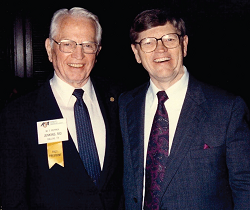 |
|
Dr. Bob Vaughan, Chair of Anesthesiology, University of North Carolina at Chapel Hill (right), is pictured with Dr. Pepper Jenkins, Chair of Anesthesiology, UT Southwestern Medical Center, during Dr. Jenkins’ election as the new President of the American Society of Anesthesiologists in 1989.
|
This blend of medical and business education propelled his career, and he went on to serve in numerous leadership positions in both for-profit and not-for-profit organizations at the local, state, and national levels around the nation.
Dr. Sue Vaughan attributes her husband’s encouragement and can-do attitude as among the factors that pushed her to reach beyond a BSN into the complex world of graduate education and health care leadership. After earning her Ph.D. in clinical nursing research, she spent 30 years in nursing clinical care, teaching, research, administration, and consulting in leading academic and private institutions.
During their careers, they recognized the lack of formal leadership training for aspiring physicians while in medical school. The Vaughans share a deep passion for leadership mentoring and were thrilled to learn about the Housestaff Emerging Academy of Leaders (HEAL) program, a networking and professional development program launched at UT Southwestern Medical Center through the Office of Faculty Diversity & Development in 2013 to support underrepresented groups in medicine. Subsequently, other HEAL offshoot groups were established for women and the LGBT resident and fellow trainees. The overall goal of all HEAL programs is to empower participants with strong leadership qualities so they can thrive in the academic environment.
The Vaughans began supporting UT Southwestern in 1990 and have since donated more than $141,000 in combined donations and planned giving to support their fund and other programs.
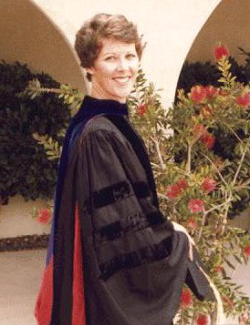 |
|
Dr. Sue Vaughan is pictured at her graduation from the University of Arizona College of Nursing in 1980 after earning her Ph.D. in Clinical Nursing Research.
|
“We dream of strengthening the next generation of doctors with a broadened portfolio of skills and human capital beyond just medical knowledge. Our excitement for the emerging HEAL program stems from releasing its enormous potential energy of diversity and inclusion. Such new colleagues will emerge from underserved minorities and women. Moreover, professional leadership development leverages the knowledge basics of deep problem solving employed by diverse and inclusive teams,” Dr. Bob Vaughan said.
The HEAL program at UT Southwestern is one of only a few of its kind in the nation. The Vaughans are also involved in the programmatic planning of a leadership program at the University of Arizona in Tucson, where they have resided since retiring from clinical practice over 12 years ago. They believe the impact of their efforts is far reaching.
“Only talented, diverse team leaders who foster collaboration, personal professional growth with respect for colleagues, and continuous relationship building can embrace future complex health care opportunities. Tomorrow’s leaders must leverage, respect, embrace, appreciate, and recruit colleagues with differences in ethnicity, unique cultures, gender, national origin, age, physical abilities, sexual orientation, education, and religion. Working together in that human mix holds the key to using the full potential of our emerging leadership portfolio.”
Unleashing the Power of Diversity
UT Southwestern Medical Center President Daniel K. Podolsky, M.D., established the office of Faculty Diversity & Development (FDD) in 2011, and its division, Office of Women’s Careers (OWC) in 2012.
Dr. Byron Cryer, Associate Dean for FDD, and Dr. Helen Yin, Associate Dean for OWC, are well positioned to implement national best practices at UT Southwestern to promote the careers of all faculty, with particular emphasis on underrepresented groups and women. They are both active in the Association of American Medical Colleges Group on Diversity and Inclusion (GDI), and Dr. Yin is active in the Group on Women in Science and Medicine (GWIMS).
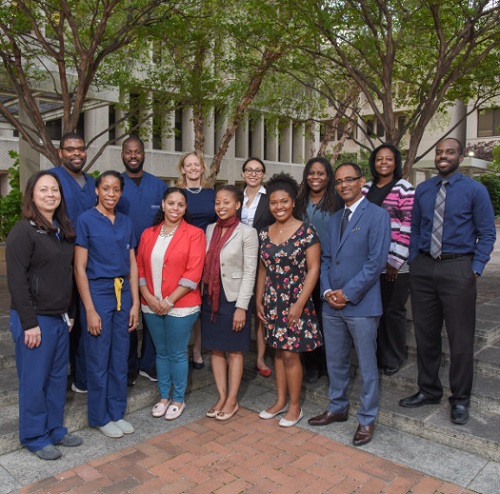 |
|
The HEAL team helps underrepresented housestaff develop into strong leaders.
|
“HEAL is a unique opportunity to invest in physician development at a critically important and stressful developmental period,” said Dr. Cryer. “The Vaughans, being clinicians themselves, had insight to recognize the benefit of investing in resident professional development. We are very grateful for their reliance in our office of FDD and were able to take the HEAL program to the next level based on their contributions.”
Dr. Dale Okorodudu is the Faculty Director for HEAL for Underrepresented Minorities in Medicine, which serves trainees who are African-American, Hispanic, American Indian/Alaska Native, and Native Hawaiian/other Pacific Islanders. He runs a clinical practice at the Dallas VA Medical Center and is an Assistant Professor of Internal Medicine at UT Southwestern. He is passionate about addressing health care disparities by promoting diversity in the medical workforce. After joining HEAL as a member during his fellowship training at UT Southwestern, he attended meetings regularly, asked questions, and used the experience for his personal growth.
“I always tell people that I felt HEAL was a second fellowship, somewhat on the track of a leadership type of pathway,” he said. “My dream is that there will be more opportunity for like-minded individuals of all backgrounds who enter the medical field because I do believe it’s talent mining—we bring more individuals from different backgrounds who bring their ideas and solutions that lead to further advancements.”
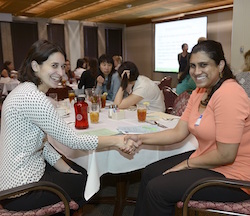 |
|
HEAL for Women empowers female residents and clinical fellows to make the most of their medical training at UT Southwestern.
|
The OWC launched HEAL for Women in 2014, which provides a coordinated approach to the recruitment, career advancement, and professional development of women faculty and trainees.
“Underrepresented groups and women at times feel isolated and marginalized, have few role models that they relate to, and are less satisfied with mentoring experiences. Accordingly, in academia, there has recently been a focus on culturally aware minority mentoring, as well as access to and mastery of both the hard and soft skills required for a successful biomedical career,” said Dr. Yin.
In 2016, HEAL for LGBT & Allies was launched and is open to all UT Southwestern LGBT trainees (residents and fellows) and faculty, as well as their supporters regardless of their identification. Dr. Kelly Klein leads the LGBT group and describes HEAL as an amazing networking avenue filled with people who could be marginalized, but instead are brought together to meet, share, and give support as needed. The group has led to amazing conversations, which open minds and doors.
“Medical school is an incredibly competitive environment, made up of people who are very driven and often do not have a large social support network,” said Dr. Klein. “This is difficult enough during exams and getting prepped for becoming a junior physician. For the LGBT student, this can be even more stressful, and the decision to be open or to be closed hangs in the balance. Making sure that HEAL has an LGBT component is essential to help people realize that there are others all around us who not only support the LGBT community, but also are a part of it – out and proud.”
Dr. Marc Nivet, Executive Vice President for Institutional Advancement, said, “Diversity is a catalyst for innovation and fundamental to UT Southwestern Medical Center’s commitment to excellence. Each day, diversity and inclusion are woven into the fabric of our campus, thanks to the generosity of the Vaughans and their support of the HEAL program.”